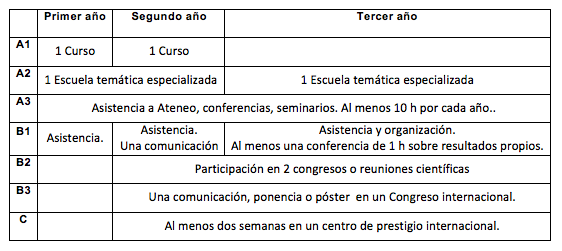The supervision and monitoring of the doctoral student, both in terms of training and the progress of the doctoral thesis, depends primarily on the thesis supervisor and the tutor. However, the Academic Committee, as the highest body responsible for the Doctoral Programme, will exercise its supervisory role through the annual monitoring and certification of the doctoral student's "activities document".
Once the thesis supervisor has been appointed by the Academic Committee, the PhD student, the tutor, the thesis supervisor and the Programme Director will sign a documentary commitment to supervision in accordance with the regulations and format established by the University of Valladolid (BOCyL nº 243 of 19 December 2012).
During the first year, the PhD student will prepare and present the Research Plan to the Academic Committee, which will be endorsed by his/her tutor and thesis supervisor. In accordance with current regulations, the Research Plan is understood as a dynamic document that may be modified and improved throughout the duration of the programme.
From the moment of enrolment, the student's personal "activities document" will be opened as an individualised record document for the control of his/her activities and different stages. The University of Valladolid has established a format and a minimum catalogue of sections that the activities document must include (BOCyL, nº 243 of 19/12/2012). The platform for the Academic Management of the PhD is the tool provided by the UVa so that the PhD student can telematically include as many contributions as they consider relevant in their activity document, along with the documentary certification of the same in cases where it is necessary. The tutor, the thesis supervisor and the Academic Committee will have access at all times to the doctoral student's activity document, thus enabling continuous supervision and monitoring of their activity.
Each year, the Academic Committee will evaluate the activity document of each doctoral student and, where appropriate, issue the corresponding certification. Prior to this, the required reports will be requested from the tutor and thesis supervisor. The Academic Committee may request external reports from researchers outside the Programme, whether national or foreign, whenever it deems appropriate. Together with the activities document, the Committee will evaluate the Research Plan, incorporating, where appropriate, any modifications that may have been made to it.
The activities listed annually in the doctoral panel (in relation to sections A1, A2, A3 and B1, see section 4), as they are organised within the same programme, will be considered as activities already recognised, respecting the individual assessment of each one of them that may have been recorded by the person in charge of the activity. The different training activities offered in the "doctoral training panel" may be substituted by the doctoral student for others that, in the opinion of the supervisor and tutor, are more appropriate to cover their training, with the final objective of presenting the doctoral thesis. However, these must be communicated in advance to the Academic Committee, be comparable to those described in the training panel and, in any case, be recognised and accredited by the Academic Committee annually. The Academic Committee may establish specific criteria for the recognition and assessment of the different training activities and experiences not carried out within the scope of the Programme itself.
As a guideline, an approximate ideal model of activities and experiences that the student should complete to ensure the acquisition of the programme's competences and which lay the training foundations for the successful completion of doctoral studies is specified:

In the case of part-time students, the above table will be adapted to the student's personal situation. As a general rule, the different activities of the first two years will be spread over the first three years and the third year over the last two years
The Programme will encourage the completion of theses with the mention of "International Doctor". In this case, in section C) the student must spend at least 3 months in a foreign centre. The participation of international experts will be sought in the assessment prior to the reading of the thesis as well as in the thesis defence tribunals.